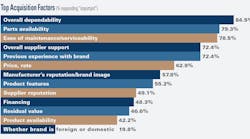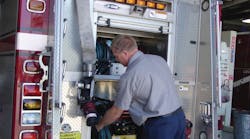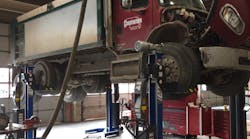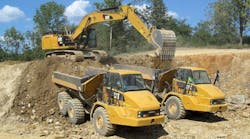As the Association of Equipment Management Professionals (AEMP) so aptly explains, “Outsourcing represents change. Change presents risks. Most employees resist change and avoid risks.”
That leaves fleet professionals in a quandary, because they know the investment necessary to build an infrastructure with enough capacity to handle minor, major and specialized repairs is too risky to justify. There is no acceptable ROI, not to mention the fact that adequately trained technicians may not be available.
The alternative? Outsourcing.
One way to overcome the fear of outsourcing and the tendency of workers to resist change is to build an ace supplier team.
Fleets that outsource successfully can be found in both the public and private sectors, located in states as different as Florida, Texas and Wisconsin. Each has taken a hard look at its operations, evaluated the risks and benefits, examined the cost factors and developed, each in its own way, a successful outsourcing strategy.
“Outsourcing has gotten a bad name because everybody thinks you're handing over your fleet to someone else,” says Marilyn Rawlings, CEM, fleet director for Lee County Government in Ft. Myers, Fla. “But all of us outsource every day. Every fleet manager does it at some level.”
Before dismissing the idea, Rawlings recommends you take a closer look at types of outsourcing.
“There is total outsourcing of your whole facility where a vendor comes in and runs the operation for you,” she says. “In that situation, the employees of a municipal fleet are no longer yours but rather are employees of the private sector. The second type of outsourcing, which we do every day, is partial outsourcing.”
For example, Lee County outsources paint and body work.
“I outsource that work to a local vendor who can do it better and cheaper than I can,” says Rawlings. “I also outsource the environmental and enforcement issues that come when you build a paint and body shop.”
Rawlings also outsources towing.
“A lot of companies will spend $250,000 to buy a tow truck, but in Lee County, I can do a lot of $50 tows and not spend a quarter of a million dollars,” she says.
One cost-saving move Rawlings implemented was to select a vendor to handle large-tire maintenance. The vendor travels to the jobsite and does the work there.
“Outsourcing large-tire maintenance saves money because it eliminates workers' compensation issues that could occur if one of our employees picked up a tire the wrong way and was injured,” she says.
But Rawlings doesn't believe every task should be outsourced. She refuses to outsource preventive maintenance, for example.
“I don't want to outsource PM because often you can make necessary repairs before a vehicle breaks down,” she says. “Some fleets may rely on vendors to alert them to upcoming problems but that requires more downtime. I have to send the vehicle somewhere else, it has to be analyzed and then they have to call me so I can approve the repairs. In the time it takes to do all that, I can have the equipment fixed and back to work.”
Mark Creel, president and owner of Creel Tractor in Ft. Myers, Fla., has worked with Rawlings for about 25 years.
“From the vendor's perspective, outsourcing repairs keeps our technicians occupied and that keeps money in the community,” says Creel. “It also gives the fleet manager time to concentrate on other issues.”
One thing Creel does for Rawlings is provide technicians with training on each manufacturer's machine he carries. Last year, he trained 15 fleet mechanics, four of whom work for Rawlings.
“We bring the fleet mechanics in and train them on our own time,” he says. “We provide them with all the schooling and all the technical support so they can go back and utilize what they've learned in their shops. I want them to work on their equipment. I want them to be comfortable working on the machines we sell. Then when they make a decision to buy new equipment and they're already comfortable on the products we sell, there's a good chance we'll win that business.”
A total outsourcing approachGreg Kittle, CEM, fleet operations manager for Ryan Central, Janesville, Wis, developed a plan that allowed him to close his repair facility completely.
“I don't have a shop anymore,” he says. “All in-shop repairs are performed by a preferred vendor.”
The vendor maintains technicians on Ryan's jobsites to perform field and shop repairs, and PM.
“There are three benefits to outsourcing,” he says. “One, you're able to use trained technicians. Fleets have changed drastically over the past few years. Having the ability to train and properly equip technicians these days is practically impossible. Outsourcing provides access to qualified technicians.
“Two, outsourcing changes a fleet's fixed costs. Once you employ someone, you're loath to let that person go because you have invested a lot of money in them. Outsourcing changes a fixed cost to a variable cost. If you send a dealer mechanic back to the dealership, he's still employed and he's still accessible later.
“And three, you protect and manage the liability of repairs because the dealer can perform warranty work on-site. Repairs done by the dealer tend to be supported long-term by the manufacturer. This is important because you know the work is being performed according to the manufacturer's recommendations. If there are any issues—safety, product liability, etc.—you're able to engage the manufacturer and the dealer.”
About the only thing of value a fleet manager might retain in-house, according to Kittle, is fabricating equipment.
“If you take a dozer and add a component to make it more useful in a certain application neither the dealer nor the manufacturer is likely to have the expertise to do the job,” he says.
Beyond that, Kittle says no repairs justify exposing the company to repair liability.
Dennis Kelly, customer experience manager at Patten Tractor & Equipment in Northern Illinois and Northwest Indiana agrees.
“When you outsource, you have trained people doing the job for you,” he says. “If you don't feel someone fits your game plan, you don't have to go through the process of firing them. Also, you get a warranty in case anything goes wrong.”
Partial outsourcingAnother municipal fleet manager who believes in outsourcing is Irene Grant. As fleet manager for the City of Abilene, Texas, outsourcing repairs appeals to Grant because it decreases liability.
“You transfer responsibilities, such as meeting EPA requirements, to someone else,” she says. “In many cases, outsourcing can also be more cost-effective.
But the decision to outsource work, Grant says, depends on the type of fleet you have.
“Those of us who have very complex fleets that range from law enforcement vehicles to off-highway units find outsourcing can be a little trickier,” she says.
Although Grant says they have no intention of outsourcing fleet operations, some work is outsourced, such as transmission overhauls, engine rebuilds and major body work, vehicle inspections and hydraulic air tool repairs.
“You don't have to do the things you aren't good at,” she says. “By outsourcing that type of work you can concentrate on the things you really know how to do.”
For Grant, determining which work should be outsourced and which shouldn't comes down to availability.
“In Abilene, we are a city by ourselves,” she says. “External resources are limited to the neighborhood. Some jobs are worth shipping off, but that increases downtime.”
The availability of qualified technicians plays a critical role in an outsourcing decision.
“We are trying to determine if we can keep trained technicians and continue to train them,” says Grant.
Matching the outsourced task with the supplier depends on who is out there and who can have the job done in a reasonable period of time, says Grant.
“The choice is simple if the equipment is Caterpillar, John Deere, Komatsu, Case or New Holland,” she says. “Those OEMs have local dealers.”
But with other types of repairs—bucket truck inspections, for example—she has no choice but to ship it off to the nearby town of Snyder, about 85 miles away.
Considering costRawlings says any fleet professional considering outsourcing should first take a hard look at in-house operations and costs.
“You absolutely have to be honest with yourself,” she says. “Nobody likes to admit they have weak areas, but everyone does. So first, do a cost analysis. Then ask yourself, 'Can anybody else do the work better and cheaper and take on all the risks involved?' Risk has to be part of the decision.”
Tasks that are done well in her shop are hydraulic repairs and air conditioning work. What's not done so well are large engine repairs and engine rebuilds.
“We want to supply the most efficient, least expensive and fastest service to our customers,” she says.
Managing vendorsObviously, the one thing any fleet professional must do is manage the tasks that are outsourced.
“We ask the dealer to provide repair information electronically in our format,” says Kittle. “Their field mechanics fill out our time sheets, which are balanced against our invoices. They use our systems and processes.”
At her facility, Rawlings keeps the responsibility for outsourcing a repair at the shop level.
“Some fleet managers want to be the only person to approve outsourcing,” she says. “I empower my staff to make that decision. For example, if we're backed up in the shop for two days, everything can go out during that time period. Whoever makes the decision to outsource follows the machine through the entire process. They are responsible for making sure the hourly rates negotiated are the rates that are on the bill. Then the bill is double-checked again when it's paid. But the initial review is made by the person who made the call.”
According to Grant, the key to managing outsourced work lies in the data flow.
“Vendors and dealers will give you online, real time information,” she says. “Once you make the decision to outsource, you have to keep the data flowing. You can't afford to lose that.”
While outsourcing may be looked on with skepticism by many, the truth is many fleet managers are already doing it. And it works.





